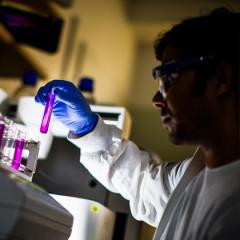AIBN research facility BASE hosted an RNA Afternoon on April 7, with Australian experts discussing mRNA therapy advances – and impacts such as on liver disease treatment.
BASE Director, AIBN Associate Professor Tim Mercer, said the RNA Afternoon explored the changing landscape, manufacturing and the science behind mRNA therapies.
Dr Mercer told the gathering synthetic mRNA therapy had the potential to correct genetic mutations.
“Synthetic mRNA therapies can essentially deliver a genetic message to a cell – and one of the most intuitive applications is to deliver a corrected gene message to patients with inherited genetic diseases.
Such mutations were inherited and affected 300 million people, with 97 per cent currently considered incurable, he said.
 “To give you an example, if you have a mutation in an enzyme which interferes with metabolism and causes liver disease, we can supply a synthetic mRNA which supplies a corrected version of that enzyme.”
“To give you an example, if you have a mutation in an enzyme which interferes with metabolism and causes liver disease, we can supply a synthetic mRNA which supplies a corrected version of that enzyme.”
People currently require organ transplantation and lifelong immune suppression.
With $50 billion in global investment in the past two years and BASE manufacturing synthetic DNA and RNA technologies that underpin translational research nationally, impacts were certain to be felt, Dr Mercer said.
“While much of that investment is undoubtedly due to the unprecedented circumstances of the pandemic, it’s also driven a huge amount of investment and attention in mRNA as a new therapeutic platform,” he said.
“We’ve seen how mRNA therapies have impacted our lives – and it’s almost inevitable that with this much investment and attention, that in the next 10 years we are going to see new, astounding and totally unexpected advances resulting from this investment.
“It’s really this potential which is driving so much excitement within the field today.”
Dr Mercer said the potential added to advances already occurring in the field, including the manufacturing at BASE of RNA for research into treating many cancers as well as genetic and infectious diseases.
The RNA Afternoon also heard from Monash University’s Professor Colin Pouton, who has one of 33 global vaccines entering a Phase I clinical trial, and UNSW Sydney’s Professor Palli Thordarson, who contributes his chemistry background in collaborations with biologists and experts in pharmaceuticals.
Also part of the afternoon were expert panellists Professor Neena Mitter. from UQ’s Queensland Alliance for Agriculture and Food Innovation (QAAFI) and Professor Nigel McMillan from Griffith University.


